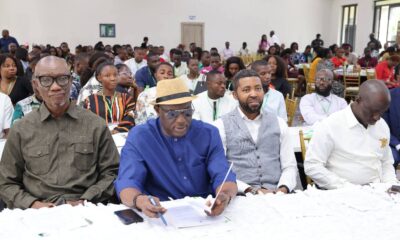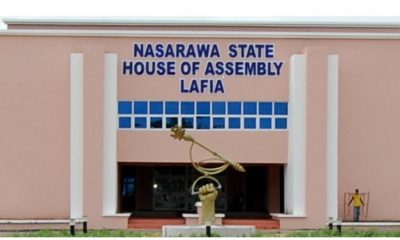Opinion
Is Keshi’s Sack Solution To Nigerian Football?
Mr Adams Chinwo
We knew that Keshi was not doing well and a lot of us are happy with his sacking but we don’t know why they are bring Shuaibu back to Super Eagles. We know that the last time he coached us he did not do well. We need a foreign coach to coach the Super Eagles. We don’t need any local coach any more because they are not doing well. NFF has been confused. We know that for quite a long time now, there has been problem in NFF and our prayer is that the new leadership of NFF will do well. But for me, Keshi was the problem of the Super Eagles. We don’t know why they are bringing back Shuiabu Amodu. We need a foreign coach. I think Keshi should have left the Super Eagles long before now. I thought he should have gone after the World Cup but he didn’t. So we are happy with his removal.
Mr Henry Okechukwu Amaehule-A Footballer.
For me I don’t see the sacking Stephen Keshi as a good decision at this point in time. I had expected them to sack himimmediately after the world cup when they had a little issue with him. They should have allowed him to finish this qualifiers before giving him the matching order. For me, bringing back the former coach, Shuaibu, is not going to help our team because he has coached this team before and he achieved nothing. Bringing him back again seems we don’t know where we are going. I expected them to bring in a good coach be him foreign or local but let him be a good tactician, someone who knows what to do at the right time because we have some good coaches in this country who go out side and succeed. It doesn’t matter where the coach comes from. We have hired a good number of foreign coaches and they achieved nothing. The likes of Lars Lagerback and Bora.They achieved nothing. So bringing a foreign coach is not really the solution. What we need is a good tactical coach who knows what to do and who knows how to handle the team.
The problem of football in this country is both coaching and administration. I don’t really know if the people at the helm of affairs of football administration love football. If they have the interest of Nigerian football in mind we wouldn’t have been in this present mess. What most of them are interested in is how to enrich themselves, how they will bring in a coach or a player person and they will be receiving certain amount of money from him instead of working for the future of the game. For the coaches, they always want to engage players they can bend. When a player is not dancing to their tune, even when such player is good they will not use rather they will want “their boys” to play at all cost. They are the ones condoning indiscipline in the team. So coaching and administration is the bane of Nigerian football. Back in the days we were doing better than this even on professional level. But instead of our game to grow, it keeps going down every day.
Having said that, I will also like to blame our players. We all watch the games. Sometimes they don’t play like professionals. They play like amateur. Watch any European football, you will see them playing as if their lives depend on it. But our own players keep saying if they have injury nobody will cater for them, forgetting that they are playing the game to make names too.
Mr Manly Obilor – an Applicant.
For me, Nigerian football is not moving forward. The football administrators are not helping matters at all. What they are interested in is how to make money and not really helping the game to grow. So the problem of Nigerian football basically is administration, coaching and the players because the players play as if nothing is at stake. Just look at what they played against Congo, South Africa and away to Sudan. They are not making us enjoy football anymore and many Nigerians are loosing love for the game because of the way they play.
However, I don’t think the timing of Keshi’s sack was right. They should have allowed him to finish what he started and whether he fails or passes, he goes. But sacking him now is not a good idea. The way out is hiring someone with new ideas because the way the players are playing now is as if they are not being told what to do. We need some one that can talk to the players and tell them what to do. The players see Keshi or local coaches as one of them, so bringing in a foreign coach will be better for us. Shuaibu Amodu to me is a failure. We are not moving forward by asking him to come back. To me I would have prefared someone like Siasia to be the coach of the Super Eagles for the now.
Mr. William Uzoma- Business man.
I think the firing of Keshi is a welcome development because Keshi is tact less. The way the guy starts the game that’s the way he ends it. And I don’t think he had the right people in his team. We have some body like Ike Uche, who has been scoring goals in Spanish league but he has not been invited to the team. He claimed that Ike Uche is not disciplined but his club. Coach said that he is okay, that he is very disciplined. We also have someone like Emenike who is playing world class football but he never used him.
All over the world we hire and fire coaches so I don’t see any big deal there. Administrators are not, the ones who play the ball. Here players do their work and Administrators do their. So I think our problem is coaching. I know NFF has been in turmoil for sometimes now. That will definitely have impact on the game but principally, our problem is coaching. I don’t really think Shuaibu can do that job. We have tested Shuaibu before and he did not impress us. We need a foreign coach. Siasia is not bad. Siasia is a disciplined coach. I think someone like that can do that job.
Mr Christian Iheji- Businessman
For me, sacking Stephen Keshi was not a good idea. I thought he should have been given more time to see if he could qualify the team for the nations cup. Sacking him at this point in time, I don’t find it so good for the country. Keshi tried his best to build the team but the boys were not serious with the game. Our boys are not working hard to see that the team grows. One could see some sentiments in the team. Because certain players are were in the team, some others refused to cooperate with the coach. I see that sentiment in the team and it is not very good for us.
I think Shuaibu can perform because he has been there before. All we need do is to encourage him to do his best.
We also need a better football administration because if the administration is not in order, the coaches and the players are affected. The NFF, coaches and players should see how they can work together to improve the team. This is our national team, so we must work together to achieve our aim. It will be a shame if as the defending champion we are not seen at the next nation’s cup. There is still a slight chance of qualifying we must do everything possible to maximize that opportunity.
Amaka Nathan – Business woman
I think sacking Keshi was the best decision because the man was not doing well. All he was doing was benching players that can deliver and bringing the ones that cannot do any good thing. I used to watch Nigerian football before, but since Keshi came on board, I lost interest due to his coaching style and his arrogance. He would refuse to invite good players and insist on using only his favourite players irrespective of their capabilities. He is a stubborn man. He was boasting that a lot of countries were begging to hire, so let him pick up one of these many offers. Let’s see what Shuaibu Amodu can offer. Maybe he will qualify our team for the cup of nations. But I think he needs the help and encourgament of everybiody to achieve this heavy task. Our government should allocate more money for football. Look at our stadium, many of them are nothing to write home about, I have always asked, why is it that any time our teams are playing , it’s either there will be power failure, the TV stations will not be clear and a lot of other problems? I don’t understand. So the problem of Nigerian football is both administration, coaching and governance and all the stake holders really need to join hands in solving these problems.
Opinion
Why Reduce Cut-Off Mark for C.O.E ?
Opinion
Welcome! Worthy Future For R/S
Opinion
Restoring Order, Delivering Good Governance
The political atmosphere in Rivers State has been anything but calm in 2025. Yet, a rare moment of unity was witnessed on Saturday, June 28, when Governor Siminalayi Fubara and Minister of the Federal Capital Territory, Chief Nyesom Wike, appeared side by side at the funeral of Elder Temple Omezurike Onuoha, Wike’s late uncle. What could have passed for a routine condolence visit evolved into a significant political statement—a symbolic show of reconciliation in a state bruised by deep political strife.
The funeral, attended by dignitaries from across the nation, was more than a moment of shared grief. It became the public reflection of a private peace accord reached earlier at the Presidential Villa in Abuja. There, President Bola Ahmed Tinubu brought together Governor Fubara, Minister Wike, the suspended Speaker of the Rivers State House of Assembly, Martin Amaewhule, and other lawmakers to chart a new path forward.
For Rivers people, that truce is a beacon of hope. But they are not content with photo opportunities and promises. What they demand now is the immediate lifting of the state of emergency declared in March 2025, and the unconditional reinstatement of Governor Fubara, Deputy Governor Dr. Ngozi Odu, and all suspended lawmakers. They insist on the restoration of their democratic mandate.
President Tinubu’s decision to suspend the entire structure of Rivers State’s elected leadership and appoint a sole administrator was a drastic response to a deepening political crisis. While it may have prevented a complete breakdown in governance, it also robbed the people of their voice. That silence must now end.
The administrator, retired naval chief Ibok-Ette Ibas, has managed a caretaker role. But Rivers State cannot thrive under unelected stewardship. Democracy must return—not partially, not symbolically, but fully. President Tinubu has to ensure that the people’s will, expressed through the ballot, is restored in word and deed.
Governor Fubara, who will complete his six-month suspension by September, was elected to serve the people of Rivers, not to be sidelined by political intrigues. His return should not be ceremonial. It should come with the full powers and authority vested in him by the constitution and the mandate of Rivers citizens.
The people’s frustration is understandable. At the heart of the political crisis was a power tussle between loyalists of Fubara and those of Wike. Institutions, particularly the State House of Assembly, became battlegrounds. Attempts were made to impeach Fubara. The situation deteriorated into a full-blown crisis, and governance was nearly brought to its knees.
But the tide must now turn. With the Senate’s approval of a record ?1.485 trillion budget for Rivers State for 2025, a new opportunity has emerged. This budget is not just a fiscal document—it is a blueprint for transformation, allocating ?1.077 trillion for capital projects alone. Yet, without the governor’s reinstatement, its execution remains in doubt.
It is Governor Fubara, and only him, who possesses the people’s mandate to execute this ambitious budget. It is time for him to return to duty with vigor, responsibility, and a renewed sense of urgency. The people expect delivery—on roads, hospitals, schools, and job creation.
Rivers civil servants, recovering from neglect and under appreciation, should also continue to be a top priority. Fubara should continue to ensure timely payment of salaries, address pension issues, and create a more effective, motivated public workforce. This is how governance becomes real in people’s lives.
The “Rivers First” mantra with which Fubara campaigned is now being tested. That slogan should become policy. It must inform every appointment, every contract, every budget decision, and every reform. It must reflect the needs and aspirations of the ordinary Rivers person—not political patrons or vested interests.
Beyond infrastructure and administration, political healing is essential. Governor Fubara and Minister Wike must go beyond temporary peace. They should actively unite their camps and followers to form one strong political family. The future of Rivers cannot be built on division.
Political appointments, both at the Federal and State levels, must reflect a spirit of fairness, tolerance, and inclusivity. The days of political vendettas and exclusive lists must end. Every ethnic group, every gender, and every generation must feel included in the new Rivers project.
Rivers is too diverse to be governed by one faction. Lasting peace can only be built on concessions, maturity, and equity. The people are watching to see if the peace deal will lead to deeper understanding or simply paper over cracks in an already fragile political arrangement.
Wike, now a national figure as Minister of the FCT, has a responsibility to rise above the local fray and support the development of Rivers State. His influence should bring federal attention and investment to the state, not political interference or division.
Likewise, Fubara should lead with restraint, humility, and a focus on service delivery. His return should not be marked by revenge or political purges but by inclusive leadership that welcomes even former adversaries into the process of rebuilding the state.
“The people are no longer interested in power struggles. They want light in their streets, drugs in their hospitals, teachers in their classrooms, and jobs for their children. The politics of ego and entitlement have to give way to governance with purpose.
The appearance of both leaders at the funeral was a glimpse of what unity could look like. That moment should now evolve into a movement-one that prioritizes Rivers State over every personal ambition. Let it be the beginning of true reconciliation and progress.
As September draws near, the Federal government should act decisively to end the state of emergency and reinstate all suspended officials. Rivers State must return to constitutional order and normal democratic processes. This is the minimum requirement of good governance.
The crisis in Rivers has dragged on for too long. The truce is a step forward, but much more is needed. Reinstating Governor Fubara, implementing the ?1.485 trillion budget, and uniting political factions are now the urgent tasks ahead. Rivers people have suffered enough. It is time to restore leadership, rebuild trust, and finally put Rivers first.
By: Amieyeofori Ibim
Amieyeofori Ibim is former Editor of The Tide Newspapers, political analyst and public affairs commentator
-

 Politics21 hours ago
Politics21 hours agoINEC Trains Political Parties Officials On ICNP Use Ahead By-Elections
-

 Business22 hours ago
Business22 hours agoReplace Nipa Palms With Mangroove In Ogoni, Group Urges FG, HYPREP
-

 Business19 hours ago
Business19 hours agoNCDMB, Dangote Refinery Unveil JTC On Deepening Local Content
-
Niger Delta22 hours ago
C’River Hands Over Rubber Plantation to Private Company
-

 Nation20 hours ago
Nation20 hours agoHYPREP Reaffirms Support For Ogoni Youths …Organises Workshop For Undergraduates
-

 Business22 hours ago
Business22 hours agoIndustry Leaders Defend Local Content, … Rally Behind NCDMB
-

 Politics19 hours ago
Politics19 hours agoNasarawa Speaker Advocates Conducive Executive/Legislature Relations
-
Niger Delta22 hours ago
Delta Leverages On Extensive River Networks To Drive Blue Economy

